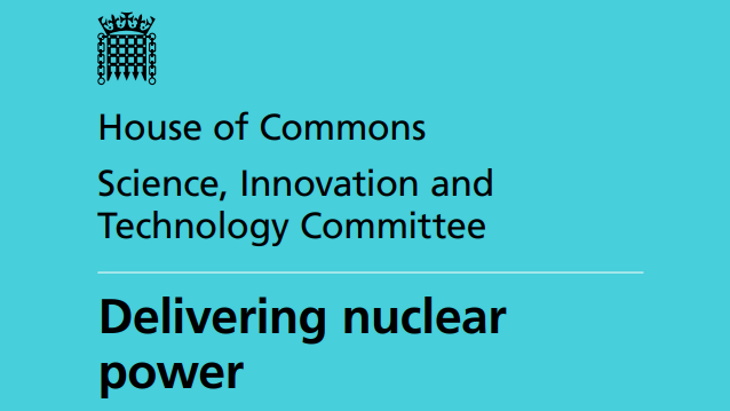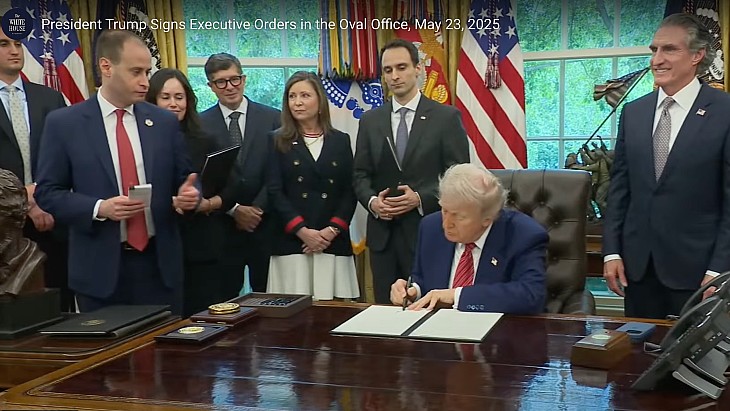UK government urged to firm up nuclear plans by MPs

Nuclear's share of energy in the UK is currently about 15%, however all but one of its reactors are scheduled to retire by 2028, the MPs note.
In April 2022, the government launched its Energy Security Strategy, which calls for the construction of eight new reactors, plus small modular reactors (SMRs), helping to produce 24 GWe capacity by 2050, representing about 25% of the UK's projected electricity demand.
The Science, Innovation and Technology Committee launched an inquiry to examine how the government could achieve the ambitions for nuclear energy that were set out in its Energy Security Strategy. It sought views on what government support would be required to establish new nuclear projects and ensure that the UK's electricity supply was not impacted by the high proportion of reactors scheduled for decommissioning, plus the challenges associated with bringing new technologies such as SMRs and advanced modular reactors (AMRs) to the grid and also how the UK should improve its approach to handling both legacy and new nuclear waste.
The committee published more than 75 written submissions to the inquiry's call for evidence, and took oral evidence from 35 witnesses from the UK and around the world, including academics, business leaders from the nuclear industry, as well as representatives from nuclear sector public bodies.
In its report - titled Delivering Nuclear Power - the committee says that the government "is right to look to nuclear power to meet our future electricity needs and that this requires a substantial programme of nuclear new build".
However, it warns that the government target of 24 GWe of nuclear generating capacity by 2050 and the aspiration to deploy a new nuclear reactor every year "are more of a 'wish list' than the comprehensive detailed and specific strategy that is required to ensure such capacity is built".
According to the report, there is ambiguity over what proportion of the government's 24 GWe target by 2050 will be met by new large-scale plants, as opposed to AMRs and SMRs. In addition, regarding SMRs, the government must decide whether technologies will be from a single supplier or multiple suppliers, what sites should SMRs be located at and what financial model would be used to pay for the contribution of SMRs to electricity supply. "Each of these questions will require a clear answer if vendors are to be able to take decisions on whether and when to take the next steps towards eventually deploying SMRs," it says.
The are also questions regarding the financing of new nuclear. The government has obtained legislative approval for a Regulatory Asset Base (RAB) model of financing new nuclear power, in which consumers - and potentially taxpayers - take on construction risk. However, the government has so far not published financial figures which allow the cost of this risk transfer to be known. The report calls for the government to publish figures, before signing contracts for new large-scale nuclear, which allow a proper assessment of value for money to be made, including setting out the level and potential cost of construction risk to be borne by the consumer or taxpayer.
The report also highlights the need for skills development to meet the growth in nuclear. If the 24 GW target is to be met, the current nuclear workforce of more than 65,000 people will need to more than double, requiring between 75,000 and 150,000 new recruits.
"The repeated requirement from witnesses across the nuclear industry was for a much clearer and more concrete strategic plan than currently exists: one which integrates commitments from a wide range of stakeholders and which is designed to go beyond the lifetime of any single government if it is to break out of the decades-long intermittency of UK nuclear energy policy," the committee said. "The committee recommends that such a comprehensive Nuclear Strategic Plan should be drawn up, consulted upon and agreed before the end of the current Parliament."
"Done right, the UK can be in the vanguard of delivering nuclear innovation, jobs and clean, affordable and reliable energy," said Chair of the Science, Innovation and Technology Committee, Greg Clark MP. "But there is now an urgent need to turn hopes into actions."
Tom Greatrex, Chief Executive of the UK's Nuclear Industry Association, said: "We must build 24 GWe of nuclear by 2050 and we can do it if we have a clear strategic plan to mobilise industry and the workforce which will require a combined effort. We welcome the report's call for a strategic plan of action from the government, which we hope will include a detailed roadmap on how to deliver SMRs, gigawatt-scale stations beyond Sizewell C and AMRs at pace and scale.
"The UK is well positioned to become a global hub for nuclear investment, with world-class sites, a competitive funding model, and in Great British Nuclear, a body that can help deliver projects. If we don't act now, we will lose out on energy security, environmental sustainability and jobs for our people."










..._58412.jpg)
